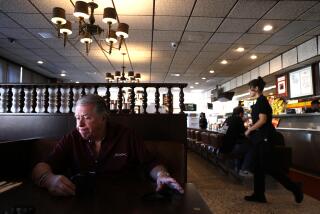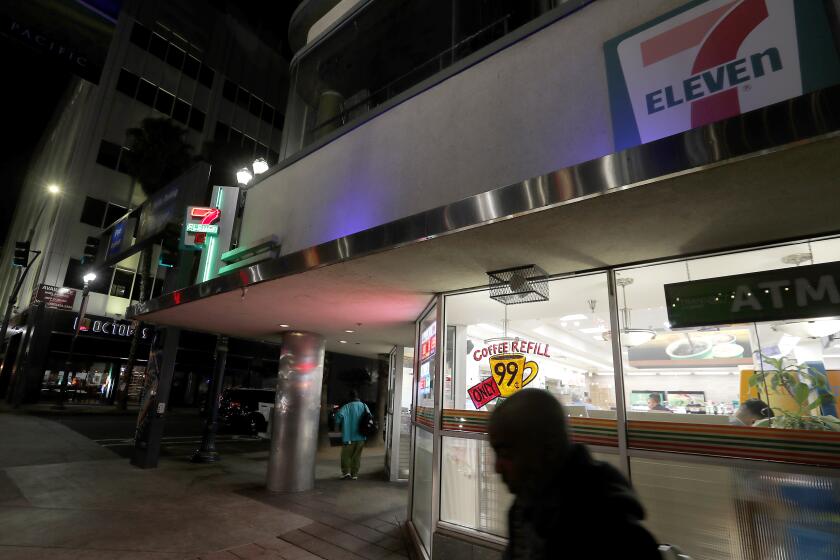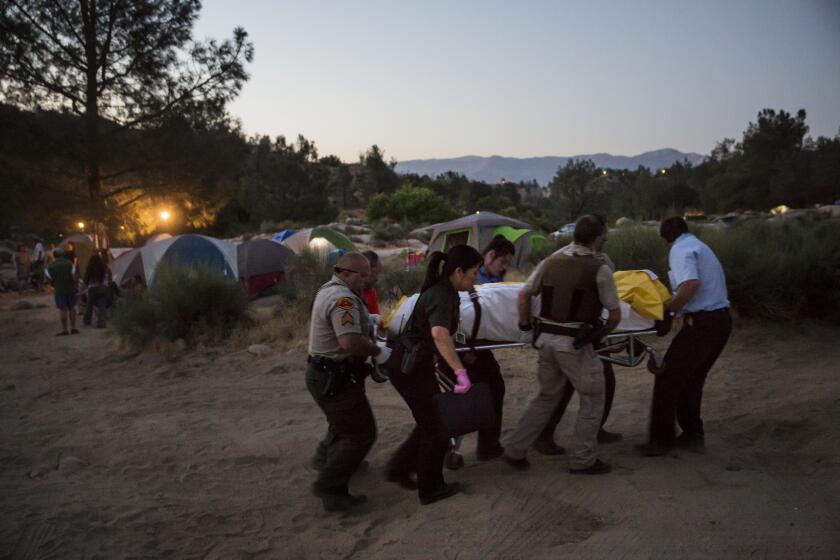Fraternity in Old Firehouse Sounds Alarm at Evict Order
The men of Sigma Alpha Epsilon can’t get any respect.
First their neighbors started complaining about excessive noise, among other things. Then the city cited them with two zoning violations. And now, they say, their landlord is attempting to evict them from the former fire station that they have been using for meetings and social gatherings.
“We’re stuck between a rock and a hard place,” said Chris Ivey, 21, the fraternity’s president. “It’s really impossible for us to go anywhere.”
To hear the fraternity men tell it, they are the victims of an overzealous city councilman’s response to complaints by a handful of neighbors whose concerns have already been addressed.
City officials, on the other hand, say the issue is compliance with zoning laws.
The landlord, under pressure from the city, says he may have no choice but to evict them.
And the neighbors seem mixed on the issue: Although some view the fraternity members as “Animal House” refugees who urinate on their lawns and keep babies awake at night, others see them as good neighbors who offer free car washes on the weekends.
“They’re rude, loud and nasty, and they’ve disturbed us many many times,” said B. J. Robertson, a pipe fitter who has lived in the neighborhood for five years.
Ted Harbage, manager of a 45-unit apartment building directly across the street from the SAE building, said: “They wake us up at night with their screaming and hollering. This isn’t the place for them.”
Down the street, however, Steven and Joanne Murphree, both 31, say that they can remember the shenanigans of their youth. “I think for their age and circumstances they are very responsible,” Joanne Murphree said. “I don’t think I was that responsible in college.”
“The problem is that a lot of people in this neighborhood are older. They’ve forgotten what it’s like to be young,” Steven Murphree said.
At the center of the issue is the fraternity house itself, a former fire station near the intersection of Wardlow Road and Cherry Avenue that still looks like a fire station except for the pair of gold-painted concrete lions that now guard its entrance. At stake is the future of the fraternity, an organization that is no stranger to controversy.
In 1983, similar complaints from other neighbors at a previous location prompted Cal State Long Beach, with which the fraternity is affiliated, to put the organization on probation for a year. In 1986, financial difficulties forced them to sell the historic house on Anaheim Street that they had occupied for seven years.
The fraternity limped along for a year without a home before finding the fire station, a 5,000-square-foot structure built in 1940. Its features included huge sliding doors, office space and a large garage area suitable for parties.
While zoning regulations prevented use of the building as a residence, fraternity members say, it seemed perfect for meetings and social gatherings because it is located in an industrial area bordered by a gasoline station, a McDonnell Douglas garage and a building owned by the Long Beach Water Department.
For about a year things went smoothly.
Then the complaints started rolling in. Residents of an apartment building and several single-family homes across the street charged that fraternity members and their guests made too much noise late at night, littered the area with beer cans, parked illegally and were in the dangerous and annoying habit of revving their engines and speeding up and down the street.
The situation deteriorated when one fraternity member allegedly exposed himself to two women in a nearby parking lot. Their husbands were employees of the Water Department, which leased the parking lot to the fraternity for nighttime use.
SAE President Ivey acknowledges that the incident occurred, but he said the fraternity brother was actually urinating in the parking lot and not deliberately exposing himself.
The incident, however, prompted City Councilman Ray Grabinski to get involved. Grabinski says he met with the concerned parties in an attempt to resolve the problems.
But fraternity members and the landlord charge that all of Grabinski’s efforts were aimed at forcing the fraternity out.
Grabinski says he bent over backward to allow the group to change its ways, but was rebuffed at every turn. “They have an obligation as students to live in the community and treat people as they should be treated,” Grabinski said. “If they are still too young to accept responsibility, then that’s their problem. There comes a time when, as parents and people involved in government, you have to pull the plug.”
Since the councilman’s initial meetings with the fraternity, he said, several developments have hastened the pulling of that plug.
First, the Water Department, concerned about the alleged exposure incident and other complaints, refused to let the fraternity use its parking lot. Then the city prosecutor’s office cited the building’s owner with two violations of the zoning law--not providing adequate parking and allowing the property to be used for residential purposes.
Ivey says the fraternity has tried to solve the parking problem by agreeing to lease space from a nearby restaurant. But the arrangement was turned down by the city, according to zoning officer Dennis Eschen, because of recent changes in city regulations that prohibit such lease agreements.
The issue of residential use, however, seems to revolve around a disagreement over how many people are allowed to live on the premises. Eschen says that city zoning ordinances permit only one live-in watchman, but Ivey says the fraternity can have three watchmen without violating the law.
After being cited by the city, owner William Steiner gave notice to the fraternity to vacate the premises by last Thursday. “What else could I do?” Steiner said. “These are clean-cut kids, and there’s nothing wrong with them. But when you’ve got a councilman on your neck, you’ve got trouble.”
A spokesman for the city prosecutor’s office said that Steiner is scheduled to appear in court Friday to show proof that he has begun eviction proceedings. Fraternity members, meanwhile, have so far ignored the eviction notice, and Steiner says he does not intend to enforce it until ordered to do so by the prosecutor.
Fraternity leaders even talk of challenging the eviction in court, but are vague as to the legal basis for such a challenge.
“It appears clear to me that they’re getting a raw deal,” said Rich Foster, a Los Angeles attorney who was a member of SAE in college. Foster says his office is considering representing the fraternity in the dispute. “Whether we can provide them with legal services that will help them stay there is another question.”
While such issues are being sorted out, life at the firehouse goes on as usual. Fraternity members say they have cut down on the number of parties, end them earlier, patrol the area to maintain discipline and have moved their social gatherings to an inner room to cut down on the noise.
But during a recent regular weekly meeting in the building, a guest speaker talked about the problems of alcohol abuse, which, she said later, could be the root of the fraternity’s problems. “It sounds like the things that have happened wouldn’t have happened if people had been sober,” said Judi Phillips, employee and student assistance program coordinator for the university.
More to Read
Sign up for Essential California
The most important California stories and recommendations in your inbox every morning.
You may occasionally receive promotional content from the Los Angeles Times.





